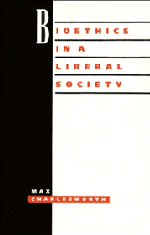1 - INTRODUCTION
Published online by Cambridge University Press: 03 May 2011
Summary
Issues in health ethics or medical ethics or so-called bioethics are very often considered in abstraction from the social and political context in which they arise. But it is obvious that making decisions about those issues will differ quite radically in a liberal democratic society as compared with any kind of non-liberal society, whether it be theocratic or authoritarian (the term is used in a neutral sense) or paternalistic or ‘traditional’. In a liberal society personal autonomy, the right to choose one's own way of life for oneself, is the supreme value. Certain consequences follow from the primacy given to personal autonomy in the liberal society. First, there is in such a society a sharp disjunction between the sphere of personal morality and the sphere of the law. The law is not concerned with matters of personal morality and the ‘enforcement of morals’. Second, the liberal society is characterised by ethical pluralism, which allows a wide variety of ethical and religious (and non-religious) positions to be held by its members. Third, apart from the commitment to the primacy of personal autonomy, there is no determinate social consensus about a set of ‘core values’ or a ‘public morality’ which it is the law's business to safeguard and promote.
- Type
- Chapter
- Information
- Bioethics in a Liberal Society , pp. 1 - 9Publisher: Cambridge University PressPrint publication year: 1993
- 2
- Cited by

